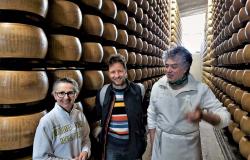An anti-Mafia street market in Palermo is set to tour the squares of Italy's largest cities in the latest bid to persuade shopkeepers and businessmen to stand up to mobsters demanding protection money.
Only food produced by businesses who have refused to pay the so-called 'pizzo' is on sale at the market, which is sponsored by Italy's Anti-Racket Federation and the Addiopizzo (Goodbye Pizzo) Association.
The street-food market has already proved a big hit with the public over the last few months, where its colourful stands have been set up in a central Palermo square.
Visitors to the market pay ten euros to taste up to four typical dishes arranged according to category: among others, there are stalls for 'u purparu' (battered and boiled octopus), 'u panillaru' (fried rice balls), 'u dolciere' (sweet pastries and biscuits) and 'u tavernaru' (Sicilian wines).
Starting in Rome's Campo de'Fiori on March 30, the anti-Mafia market will tour 22 Italian cities including Milan, Turin, Bologna, Rimini, Naples and Bari in an effort to publicise Addiopizzo's campaign to keep hard-earned cash out of Mob pockets.
There are also plans to take the pizzo-free produce to New York, Chicago, Moscow, Barcelona and Miami.
Around 14% of profits from the market go to the Anti-Racket Federation.
The anti-Mafia market comes on the heels of a new supermarket with racketeering-free credentials that Addiopizzo set up earlier this month in the Sicilian capital.
The store only stocks goods by businesses that have publicly refused to pay the pizzo.
Addiopizzo has been fighting racketeering and extortion for four years and believes that resigned acceptance of organized crime has allowed it to flourish, while change will only come if the public believes it has a choice.
It started with a secret campaign plastering Palermo with anti-racketeering stickers. When Addiopizzo eventually went public, numerous businesses joined up.
The organization now publishes a list of those businesses that have pledged to stand up to racketeers. Mafia extortion rackets are rife in southern Italy and particularly Sicily where in some cities like the capital, at least six out of ten shopkeepers are believed to pay the Mob tax.
According to a report last year by national retailers' association Confesercenti, the Mafia wrings 200 million euros a day from Italian businesses through the pizzo, loan sharking and other crimes.
The report said organised crime groups raked in 80 million euros every day from shopkeepers alone.










